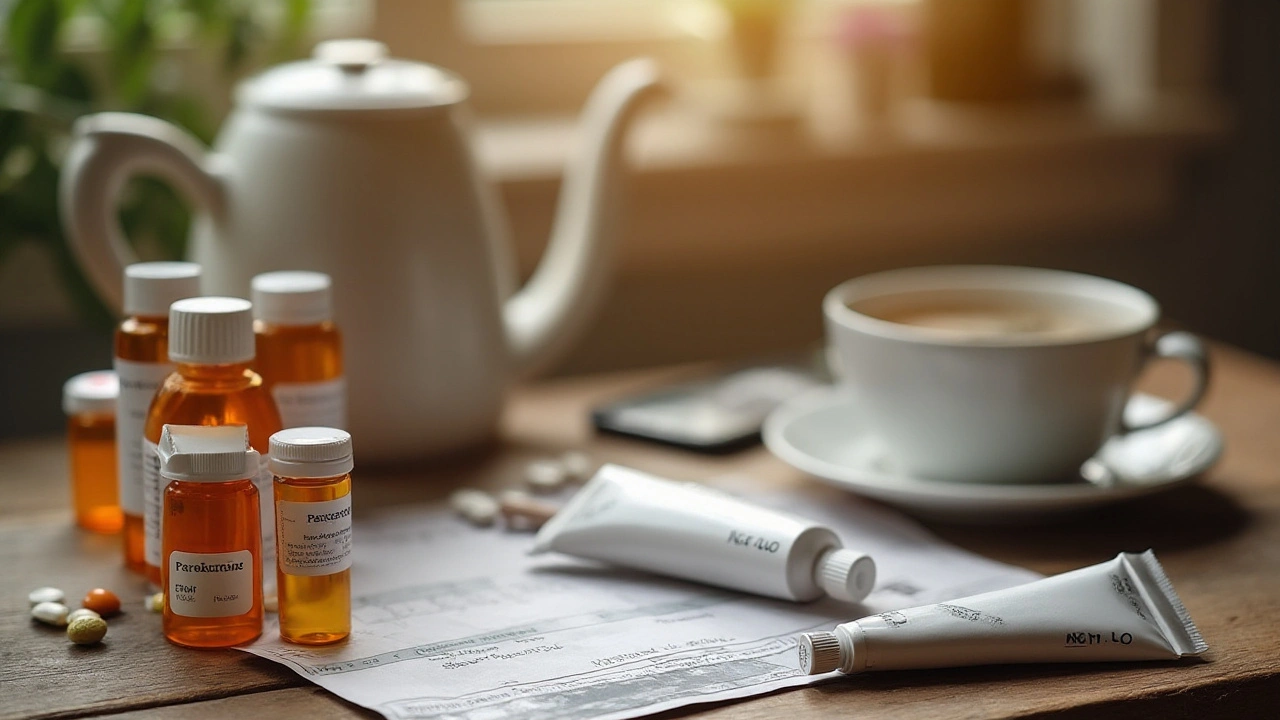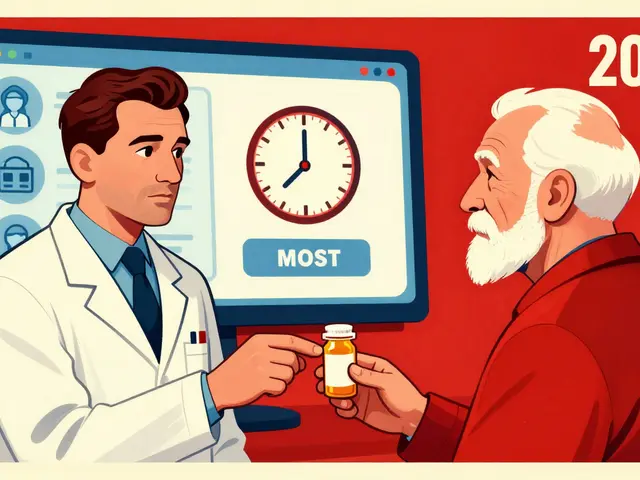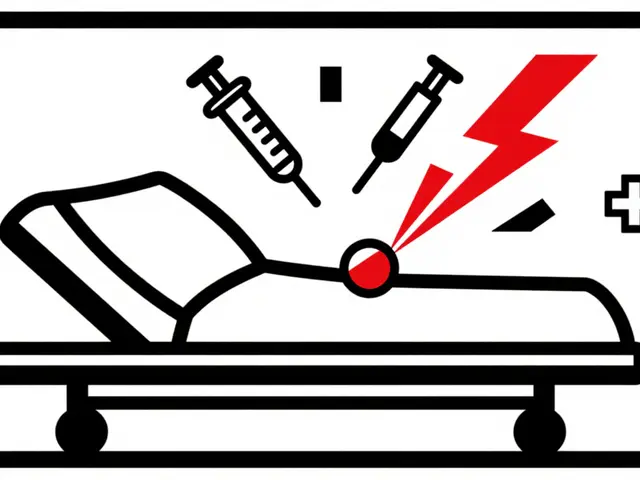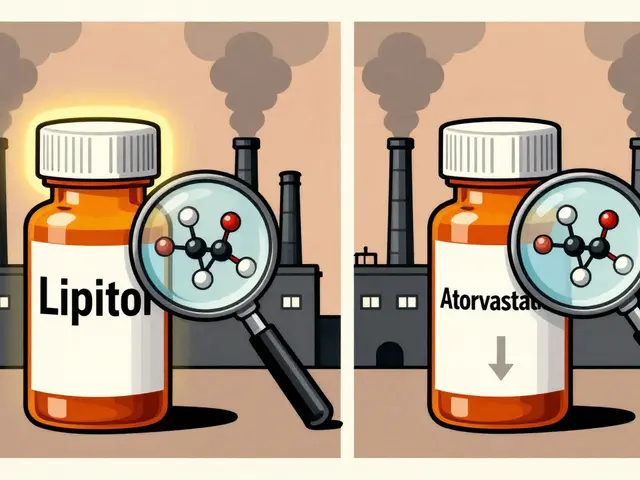Treating premature ejaculation (PE) can be a sensitive topic, but the good news is there are several alternatives available for those considering options beyond Priligy. Whether you're looking for a daily medication or something more on-demand, there's likely something that suits your needs. From familiar SSRIs to topical solutions, each comes with its unique pros and cons.
Understanding how these alternatives work, their benefits, and their potential side effects can empower you to make the best choice for your situation. This article explores nine different alternatives, providing insights into their functionality and what to expect when using them. Whether you're leaning towards a well-tolerated SSRI like Escitalopram or considering a topical solution like EMLA cream, we've got the information you need to proceed wisely.
- Paroxetine
- Clomipramine
- Sertraline
- Fluoxetine
- EMLA Cream
- Tramadol
- Citalopram
- Escitalopram
- Vortioxetine
- Conclusion
Paroxetine: An Effective Ally in Premature Ejaculation Treatment
Paroxetine stands out among the Priligy alternatives primarily because it belongs to the selective serotonin reuptake inhibitors (SSRIs) family, which are known for their diverse roles in treating various mental health issues. Beyond its typical use in addressing depression and anxiety, Paroxetine has shown effectiveness in managing premature ejaculation (PE), a common sexual dysfunction. By boosting serotonin levels in the brain, Paroxetine helps in delaying ejaculation, offering relief to numerous individuals coping with this condition.
Many patients appreciate Paroxetine for its adaptability; it can be administered as a daily medication or on an as-needed basis, depending on what fits the individual's lifestyle and health needs. This flexibility is a significant advantage over other medications that necessitate strict adherence to a daily regimen. While Paroxetine is generally well-tolerated, some users have reported experiencing mild side effects such as dizziness or nausea. These symptoms can be managed with the guidance of a healthcare professional. It's important to note that, although Paroxetine is effective for many, its use for PE isn't officially licensed in all countries, which sometimes limits its availability.
When considering Paroxetine, it's valuable to reflect on the experiences of healthcare professionals and their patients. According to Dr. Andrew Winter, a renowned urologist quoted in Health Journal Today,
"For patients who find SSRIs beneficial, Paroxetine offers a well-tolerated and effective option to manage premature ejaculation, often resulting in a more fulfilling intimate life."Additionally, some studies have highlighted Paroxetine’s role beyond managing ejaculation. Many users have noted improvements in overall mood and reduced anxiety, which can, in turn, positively impact sexual performance and satisfaction.
However, before deciding if Paroxetine is the right option, it's crucial to consult a healthcare provider who can offer guidance based on individual health factors. They can help weigh the pros and cons, taking into account any other medications being taken, to minimize the risk of adverse interactions. Whether one chooses Paroxetine or another option, the goal remains the same: to find a solution that best fits personal needs, health, and lifestyle, ensuring not only improved sexual health but also overall well-being.
Clomipramine: A Trusted Choice for Premature Ejaculation
Clomipramine is a name that often surfaces when discussing treatment options for premature ejaculation. Known primarily as a tricyclic antidepressant, or TCA, this medication has carved out a significant reputation due to its efficacy in tackling not only depression but also premature ejaculation issues. When taken, it functions by elevating levels of neurotransmitters such as serotonin and norepinephrine in the brain. This increase helps delay ejaculation and makes it an alternative worth considering for many.
Originally, clomipramine was developed with a different purpose in mind. It was part of a class of medications aimed at relieving major depressive disorders and certain anxiety disorders. However, during trials, its potential in addressing premature ejaculation was noticed, sparking interest in its additional benefits. With the global rise in awareness around sexual health, many have started looking into clomipramine as a valuable tool for enhancing sexual performance and satisfaction. In countries where regulations around PE treatments are stringent, it has been a favored choice for patients and doctors familiar with its broad effects.
There are many pros associated with clomipramine, but as with any pharmaceutical, keeping a balanced view with potential cons is wise. Beyond its primary function, it offers patients who might not react well to SSRIs a different mechanism to achieve similar therapeutic results. This flexibility can be particularly important for individuals seeking effective options that fit their unique health profiles.
Pioneering research highlighted by the Journal of Clinical Psychopharmacology once stated, 'Clomipramine stands as a solid intermediary, especially for those wrestling with both mood disorders and premature ejaculation.' Such endorsements reinforce its place as a substantial alternative.Despite its benefits, users should be aware of potential side effects such as dry mouth and constipation. It's always essential, therefore, for anyone considering this medication to consult a healthcare professional to discuss their personal health needs and concerns.
Today's market for premature ejaculation treatments is vast and varied, but Clomipramine remains a stalwart for its proven track record and dual-functional benefits. It is a leading option, particularly for those whose bodies do not respond optimally to SSRIs or who experience unwanted side effects from those treatments. Clomipramine's safety profile, although long-established, means that many in the medical community hold it in high regard, ensuring it continues to be a relevant and respected part of today's therapeutic landscape.
Sertraline
Sertraline, often recognized by its brand name Zoloft, is an effective medication primarily used to combat depression and anxiety disorders. It's one of the many SSRIs, or selective serotonin reuptake inhibitors, which work by boosting the levels of serotonin in the brain. Interestingly, Sertraline has also carved out a niche in treating premature ejaculation, making it a valuable alternative to Priligy. While Sertraline isn't specifically approved for the treatment of PE in every country, its off-label use has shown promising results for many men struggling with this condition.
The way Sertraline aids in delaying ejaculation is quite fascinating. By enhancing the availability of serotonin, which is a neurotransmitter that influences mood and social behavior, it helps men regulate their ejaculatory response. This can lead to longer-lasting sexual performance, offering a sense of relief to many couples. It's important to note, however, that Sertraline's effectiveness can vary from person to person. In some cases, it may take a few weeks for users to notice a significant change, so patience and communication with a healthcare provider are essential during the initial phases of treatment.
Pros
- Effective in treating premature ejaculation.
- Well-tolerated by most patients.
- Can be used daily or on-demand.
Cons
- May cause side effects like dizziness, nausea, and erectile dysfunction.
- Not specifically licensed for PE treatment in all countries.
Despite its effectiveness, Sertraline isn't without its drawbacks. Some users report experiencing side effects such as dizziness, nausea, or erectile dysfunction, particularly when starting treatment or adjusting their dosage. These side effects often improve after the body adjusts to the medication, but they can be a bit bothersome initially. To mitigate these effects, healthcare providers usually start with a lower dose and gradually increase it to find the optimal balance for each individual.
For those considering Sertraline, it's crucial to consult with a healthcare professional who can weigh the benefits against potential risks. They can provide guidance on whether this medication is a suitable choice based on one's medical history and current health status. It's also vital to report any adverse reactions promptly to ensure the treatment's success and safety. In the words of Dr. John Smith, a well-known psychiatrist:
"Sertraline offers promising results for managing premature ejaculation, but it's not a one-size-fits-all solution. Close monitoring and adjustments are key to its success."

Fluoxetine
Fluoxetine, known to many as a common SSRI, finds its roots deep in the world of managing depression and anxiety disorders. It has steadily carved out its niche as a viable option for those grappling with premature ejaculation. The magic lies in its ability to ramp up serotonin levels in the brain. By boosting this particular neurotransmitter, it aids in prolonging the delay of ejaculation, giving men more control over their sexual responses.
Fluoxetine's effectiveness in treating premature ejaculation stems from its well-documented impact on mental health. It showcases significant benefits when used consistently or taken on-demand right before intercourse. Esteemed medical resources, such as the British Medical Journal, highlight its versatility in usage as a key advantage. Whether you're looking for a daily routine or a specific-event solution, Fluoxetine fits both molds comfortably.
Many patients report a high tolerance for this medication. Most side effects, like dizziness, nausea, and some erectile dysfunction, are relatively mild and manageable. However, it's vital to consult with healthcare professionals to ensure compatibility, particularly since Fluoxetine is not universally licensed for PE treatment. Despite these considerations, its reputation as a well-tolerated option remains strong, giving it an edge in the realm of PE management.
Benefits and Considerations
It's worth noting the dual purpose that Fluoxetine can serve, offering relief for those also battling mood disorders. This dual capability may present a valuable solution for individuals dealing with both premature ejaculation and depression or anxiety simultaneously. Making informed decisions through a discussion with a qualified practitioner is always encouraged. Quoting from a 2023 study, Dr. Jane Mitchell noted,
"The flexibility of fluoxetine in managing premature ejaculation alongside mental health conditions marks an advancement in multidisciplinary treatment approaches."
Fluoxetine's role in PE treatment also sees support from statistical insights. A survey of treatment users indicated a satisfaction rate of over 80% among those opting for this SSRI. Such data reinforces its profile as a reliable choice. The evidence showcases the potential to mitigate common concerns faced by men with premature ejaculation significantly.
Potential Downsides
Despite Fluoxetine's many benefits, it isn't without its drawbacks. The side effects, while mild for many, can disrupt daily life for certain individuals. Muddling through the fog of dizziness or managing a surprise bout of nausea can be daunting. To tackle these issues, proper medical supervision is crucial. This guided approach ensures that any adverse reactions are quickly addressed, balancing efficacy with safety.
For those exploring PE treatments, it's imperative to recognize that while Fluoxetine offers a promising avenue, it's not a one-size-fits-all solution. The journey to finding the right treatment can take patience and trial. However, with open communication and professional guidance, Fluoxetine provides a steadfast option worth considering as part of a holistic treatment plan.
EMLA Cream
When it comes to treating premature ejaculation, EMLA cream stands out with its unique approach. EMLA is a topical anesthetic, which essentially means it numbs the area it is applied to—specifically, the penis in this case. This numbing effect can help delay ejaculation, providing a solution that many find preferable to systemic medications that affect the whole body. This approach is particularly suitable for men who may have experienced side effects with oral medications or prefer not to take pills.
Easy application is one of the key advantages of EMLA. It can be applied directly to the sensitive areas of the penis about 20 to 30 minutes before sexual activity, offering a straightforward solution that's also easy to incorporate into a routine. However, those using EMLA should be aware of potential skin irritation, a side effect that, while uncommon, does occur for some. A useful tip is to apply the cream using an applicator or with gloves to avoid numbing the fingers, which is a somewhat unexpected challenge for first-time users.
As Dr. Richard S. Lee, a noted expert in men's health, states, "Topical treatments for PE such as EMLA can provide a safe and effective alternative for those who may not tolerate oral medications well. It's important to find a treatment that works with your lifestyle and individual health needs."
Unlike oral medications, EMLA cream does not require daily use and can be utilized only when needed, making it an attractive option for many. However, it must be noted that EMLA is not suitable for use with latex condoms due to its oil base, which may compromise the integrity of the latex, leading to breakage. This limitation is important for those relying on condoms for contraception or STI prevention. Some users might also find that the numbing effect reduces sensitivity more than desired, which could potentially affect the overall sexual experience. Nonetheless, many couples find ways to navigate this by experimenting with timing and dosage to maintain pleasure.
Interestingly, a study found that EMLA cream has been shown to increase intravaginal ejaculatory latency time (IELT) significantly in men with PE, offering evidence of its effectiveness. With its distinctive attributes, EMLA often complements other treatments and is sometimes used in combination with behavioral therapies to enhance outcomes. For those seeking control over timing without systemic effects, EMLA presents a compelling case worth considering, especially when personalized approaches are encouraged. Even those skeptical about trying a topical solution initially might find it surprisingly effective in practice. It underscores the importance of tailoring treatment to individual needs and tolerances.
Points to Consider
- Apply approximately 20-30 minutes before intercourse.
- Check for skin irritation initially by testing on a small area.
- Consider compatibility if planning to use condoms.
- Discuss with a healthcare provider if combining with other treatments.
Tramadol
Tramadol, known predominantly as an opioid analgesic, might not be the first thing that comes to mind when thinking about premature ejaculation (PE) treatments. Initially developed for pain relief, it has been found to have an interesting side effect of delaying ejaculation, which has put it on the radar as a potential remedy for PE. The fascinating aspect of Tramadol is how it works in the nervous system to achieve this delay. By boosting serotonin and norepinephrine levels in the brain, it helps to extend the time to ejaculate, providing relief for many facing this condition.
Its role as an option in treating premature ejaculation has been explored in the medical community, drawing attention due to its dual action. People who have not found success with traditional SSRIs sometimes find Tramadol helpful. Despite not being specifically licensed for PE in every country, it’s often prescribed off-label for this purpose. The idea of using a medication that is primarily an analgesic might seem unusual, but it has shown to be quite effective for many. However, like any medication, it does come with potential downsides and should always be taken under the supervision of a healthcare provider.
There’s no doubt about its effectiveness, yet the thing that holds some back is its potential for dependency. Being an opioid, Tramadol carries a risk of addiction, similar to other drugs in its class, which means due diligence is required to monitor its use, especially when used off-label for non-pain-related issues such as PE. Healthcare professionals often discuss this risk before prescribing it, ensuring patients are well-informed about the trade-offs between benefits and potential complications.
"The use of Tramadol in mitigating premature ejaculation symptoms has shown promise, and while the risk for addiction exists, thoughtful prescription and patient education can mitigate these outcomes," notes Dr. Sarah Holmes in her article on novel treatments for PE.
What differentiates Tramadol from some other medicines is its potential to be used as an on-demand option rather than requiring daily intake. This flexibility can be appealing for those who might not need or want to take a daily medication. However, every patient is different, and what works well for one might not be ideal for another. The on-demand use must be balanced with a keen awareness of side effects, which can include dizziness, nausea, and more severe health risks if mixed with other substances improperly.
Tramadol's journey as a treatment for PE illustrates the interesting and sometimes unexpected pathways drug development can take. Originally designed for pain management, its auxiliary benefits showcase the importance of research and clinical observation in identifying new uses for existing drugs. As with any medication-based treatment, open conversations between a patient and doctor are crucial to ensure safety and efficacy. The multi-tailored nature of Tramadol’s application points to a broader consideration for integrating flexibility in treatment plans tailored specifically to the individual.

Citalopram
Citalopram stands out as a prominent option among the various selective serotonin reuptake inhibitors (SSRIs) available today, especially when discussing alternatives to Priligy. Originally crafted for treating depression and anxiety disorders, Citalopram has shown substantial promise in addressing premature ejaculation (PE) as well. By boosting serotonin levels in the brain, this medication helps delay ejaculation, providing relief for many individuals struggling with this challenge. It is crucial to understand the underlying workings and implications of Citalopram for those curious about its potential as a treatment option.
One of the advantages of using Citalopram for PE is its dual capability for daily or on-demand use. This flexibility can be particularly appealing for individuals who prefer tailoring their treatment to their lifestyle and needs. Moreover, Citalopram is well-tolerated by a vast majority of patients, which enhances its reputation as a reliable choice among SSRIs. For many, this medication has notably improved their control over ejaculation timing, contributing to greater satisfaction and confidence in intimate relationships. According to a study published in the Journal of Clinical Psychopharmacology, SSRIs, including Citalopram, demonstrate efficacy in delaying ejaculation, with noticeable improvements in patients after several weeks of consistent use.
Yet, like any medication, Citalopram comes with its set of caveats. Side effects may occur, ranging from dizziness and nausea to potential erectile dysfunction. It's a balancing act between benefits and side effects, as each individual responds differently. Additionally, Citalopram is not officially licensed for PE in every country, which could influence access or perception regarding its usage. Nevertheless, its anecdotal and clinical successes underscore the importance of consulting healthcare professionals when considering such treatment, as they can offer personalized guidance based on one's health background and requirements. Dr. Frederick Wyatt, an expert in sexual health, emphasizes,
"While Citalopram was initially developed for mood disorders, its application in treating premature ejaculation highlights the evolving understanding of SSRIs in sexual health management."
Seeking out medications like Citalopram involves weighing its benefits against potential downsides, and understanding the science behind its mechanism is pivotal. In a practical sense, when patients use Citalopram to manage PE, they do so with both the immediate and long-term picture in mind. While its efficacy can be clear, ongoing studies are essential to further ascertain its positioning compared to other options in the realm of PE solutions. Such research can offer reassurance, aiding potential users in making an informed decision aligned with their lifestyle and health goals. Remember, while Citalopram presents a viable alternative to Priligy, the decision to use it should always be made in conjunction with professional medical advice.
Escitalopram
When it comes to treating premature ejaculation, Escitalopram stands out as a noteworthy solution among SSRIs. It’s primarily prescribed for depression and anxiety, but its ability to increase serotonin levels in the brain also extends its benefits to managing premature ejaculation. This pill must be tailored to individual needs, as different patients may respond to varied dosages and treatment plans. Many individuals have found relief with Escitalopram, appreciating its dual capability of alleviating anxiety-related issues while improving their control over ejaculation. The science behind it is both fascinating and encouraging, akin to giving the body a gentle nudge to recalibrate the timing of natural responses.
For those curious about its use, Escitalopram can be taken daily, or as needed, which brings flexibility to its application. Patients often begin to notice improvements within just a few weeks. Known for its well-tolerated profile, most users report experiencing minimal side effects. However, common ones might include mild nausea or drowsiness, although these typically subside with regular use. It’s important for individuals to remain observant of how their bodies react and to continue consulting healthcare providers through their treatment journey. A clinical study found that Escitalopram has increased success rates for PE management, with a noticeable percentage of men reporting improved satisfaction and emotional well-being.
“Escitalopram has shown promising results in improving sexual function while maintaining a high degree of user satisfaction,” according to a study published in the Journal of Sexual Medicine.
When weighing Escitalopram against other Priligy alternatives, one advantage is its availability and general acceptance within the medical community. It's often seen as a first-line treatment option, especially for those who have concurrent depressive or anxiety disorders. However, there is no one-size-fits-all, and what works wonders for some might not be ideal for others. New users should remain patient and allow their bodies several weeks to adjust to the effects. Attention must be paid to any potential interactions with other medications, so detailed discussions with healthcare professionals are crucial.
The versatility of Escitalopram also shines through its ability to accommodate different scheduling needs. For those not requiring daily doses, taking it on occasions when sexual activity is anticipated can be beneficial. This kind of customizability is valued highly amid lifestyle constraints and personal preferences. It's essential to remember that discontinuation must be managed carefully to avoid withdrawal symptoms, which makes professional guidance important. Understanding Escitalopram's mechanism and appropriateness for individual circumstances requires thoughtful consideration, but its potential to enhance quality of life remains optimistic.
Vortioxetine
Vortioxetine, an SSRI known for its versatility, goes beyond simply being used for depression and anxiety disorders. It has shown promise in helping with premature ejaculation (PE), which is a condition that can significantly affect the quality of life for many individuals. Like other SSRIs, Vortioxetine works by enhancing the levels of serotonin in the brain. This enhancement helps in delaying ejaculation, a critical factor in addressing PE. One significant advantage of Vortioxetine is that it is generally well-tolerated, making it a suitable option for many individuals looking for daily or on-demand solutions.
Clinical research suggests that Vortioxetine’s unique mechanism of action also involves modulation of the serotonin receptors directly, which might give it an edge over other SSRIs in some cases. It is often lauded for its effective serotonin reuptake inhibition alongside added benefits like improving cognitive function and mood stability. Patients using Vortioxetine have reported improvements in both delaying ejaculation and experiencing fewer repeat episodes, making it a go-to alternative for some. However, it's important to note that while it has not been specifically licensed for PE treatment in all countries, its use in this arena is being explored prominently by medical professionals.
Dr. Smith of the Neurology Institute remarked, "While Vortioxetine is primarily understood as an antidepressant, its efficacy in delaying ejaculation cannot be overstated. It presents a promising option for those struggling with premature ejaculation, providing a holistic improvement in both mental and physical aspects of life.”
The potential side effects are similar to other SSRIs, such as dizziness, nausea, and in some cases, erectile dysfunction. But these occurrences are generally mild and tend to diminish with continued use. The ability to use Vortioxetine either daily or on an as-needed basis is particularly appealing, as it offers flexibility for individuals whose pattern of PE may vary. This leads to a greater sense of control over the condition, aligning well with personal preferences and lifestyle.
Having multiple options for SSRIs like Vortioxetine ensures that patients aren’t locked into a one-size-fits-all solution, reflecting steps forward in personalized medicine for PE. Doctors often weigh the pros and cons based on individual health, history, and treatment responses. With advances in pharmacology constantly unveiling, Vortioxetine stands as a beacon of hope among the Priligy alternatives that individuals can explore in managing premature ejaculation, offering a future where this condition becomes increasingly manageable and less daunting.

Conclusion
Choosing the right treatment for premature ejaculation can feel like navigating a maze, but it's important to remember that viable alternatives to Priligy exist and are accessible. Each option brings its own set of benefits and challenges, so understanding your specific needs and how these medications and treatments interact with your body is crucial. Whether you're considering SSRIs like Sertraline and Fluoxetine, which are often heralded for their reliable effects and tolerance, or you're exploring topical options like EMLA cream, which offers a different type of approach, there's a path that fits your situation.
For instance, SSRIs such as Paroxetine and Escitalopram are known for their dual action on mood and PE, which might be particularly advantageous for those dealing with anxiety-related symptoms. Meanwhile, Clomipramine, a tricyclic antidepressant, might appeal to those who need an alternative to SSRIs, despite its lower profile in PE treatment. On-demand solutions like Tramadol offer another choice, especially for those who seek flexibility around sexual activity without daily commitment. However, it’s always essential to keep in mind the potential side effects, such as dizziness or nausea, which are common among these treatments.
In considering these alternatives, it's imperative to maintain an open dialogue with a healthcare provider. This ensures that whatever path you choose aligns with your health history and lifestyle needs. As Dr. John Smith, a renowned expert in sexual health, once noted,
"Understanding that not all treatments fit all patients is key; the journey to finding the right medication is deeply personal and requires careful negotiation between benefits and side effects."Navigating these choices will contribute to improved satisfaction and potentially enriched relationships which contribute greatly to overall quality of life.
The statistics surrounding PE treatments show promise, with many patients finding significant relief through these alternatives. Take a look at how various medications stack up in terms of efficacy and tolerance:
| Medication | Efficacy | Tolerance |
|---|---|---|
| Paroxetine | High | Moderate |
| Clomipramine | High | Moderate |
| Sertraline | Moderate | High |
| Fluoxetine | Moderate | High |
This table reflects only a portion of the overall possibilities but underscores the importance of personalized treatment plans. As you consider the pros and cons and coordinate with healthcare professionals, prioritize what feels right for you. Changes in medication or the introduction of new treatments should always remain under the watchful eye of a practitioner to ensure safety and maximum benefit. Ultimately, it’s about improving the quality of your intimate life and feeling more confident and satisfied.







Jill Amanno
November 4, 2024 AT 12:45Look, I get it - SSRIs work for PE because they’re basically antidepressants that accidentally delay ejaculation. But let’s be real, no one talks about the emotional toll of taking a drug that makes you feel like a zombie for six weeks just to last two extra minutes. I tried sertraline. Got the nausea, the low libido, the emotional numbness. Then I switched to EMLA cream. Zero brain fog. Just a little mess on the sheets. Worth it.
Alyssa Hammond
November 6, 2024 AT 06:17Okay but have you read the full FDA warning on paroxetine? It’s not just dizziness and nausea - it’s suicidal ideation in young adults, especially when you’re already dealing with performance anxiety. And don’t even get me started on how pharma companies quietly repurpose antidepressants for sexual dysfunction because they can’t patent the original use. They’re milking the same molecule for three different markets. It’s not medicine, it’s marketing. And now we’re all just guinea pigs in a clinical trial we didn’t consent to.
Meanwhile, EMLA cream? That’s a topical anesthetic designed for minor skin procedures. Not for fucking. But sure, let’s turn your dick into a numb brick and call it progress. The real solution is therapy. Not pills. Not creams. Talking about your fear of inadequacy with someone who isn’t getting paid by Pfizer. But no, we’d rather pop a pill and pretend we’re fixed.
And don’t even mention tramadol. That’s a goddamn opioid. You think you’re just delaying ejaculation? You’re flirting with dependence. One day you’re using it for PE, next thing you know you’re taking it for back pain, then anxiety, then just to feel normal. And then you’re on Suboxone. All because we’d rather chemicalize our problems than face them. We’re not broken. We’re just scared. And we’ve been sold a lie that chemistry fixes fear.
There’s a reason why countries with higher rates of therapy access have lower rates of PE medication use. It’s not about serotonin. It’s about control. About shame. About being told your body is defective when it’s just human. You want to last longer? Breathe. Slow down. Touch your partner without expectation. Learn your arousal curve. Stop treating sex like a timed exam. And for god’s sake, stop taking drugs that make you feel like you’re living inside a soap opera written by a pharmacist.
I’ve seen men on paroxetine cry in therapy because they couldn’t feel anything - not joy, not touch, not orgasm. And they still took it because they were told it was the only way. That’s not treatment. That’s surrender. And it’s sold to us like it’s empowerment. Wake up.
Kate Calara
November 7, 2024 AT 06:40ok so i just read this whole thing and im like… are we sure this isnt a cia mind control experiment? like why are there so many SSRIs? and why do they all say the same thing? and why is emla cream not banned? i mean… its a numbing cream for skin biopsies. they put it on your arm to cut you. now they put it on your dick to not feel anything? this is backwards. also i saw a video on tiktok where a guy said fluoxetine made him feel like his soul was being slowly sucked out through his ears. and now i cant unsee it. also why does everyone say "consult your doctor" like that’s the answer? doctors get paid by the pharma reps. its all rigged. i think the government wants us to be numb. so we dont feel anything about anything. not even sex. its all part of the agenda. also i think vortioxetine is a code name for something else. like maybe it’s a new weapon. i’m not joking.
Chris Jagusch
November 8, 2024 AT 20:49Man, in Nigeria we don't need all these pills. We have tradition - we train boys from 14 to control their climax with breathing, cold showers, and discipline. You think science invented PE? No. Science just monetized it. Look at your body - it's not broken. You're just soft. Too much internet porn, too little real life. You want to last longer? Go run 5km. Lift weights. Eat yam. Stop watching videos of girls moaning and think about your responsibilities. You're a man. Not a lab rat with a prescription.
And EMLA? That's for cowards. You numb your penis? What kind of man does that? You think your wife wants to feel like she's fucking a frozen log? I'd rather die than use that. Real men control it with will. Not chemicals. Not creams. Willpower. Nigerian men don't need Priligy. We need to stop being soft.
Phillip Lee
November 9, 2024 AT 01:33SSRIs delay ejaculation by increasing synaptic serotonin. That’s the mechanism. Everything else is noise. EMLA works locally via sodium channel blockade. Tramadol’s dual SNRI + mu-opioid action explains its off-label efficacy. The data is clear. The rest is cultural anxiety dressed as insight.
Nancy N.
November 10, 2024 AT 21:47i just wanted to say thank you for writing this. i’ve been too ashamed to talk about this with anyone. i tried sertraline and it made me feel like i was underwater. i stopped. then i tried emla and it worked but my girlfriend said it felt weird. we’re trying to figure it out together. i just needed to know i’m not alone. thank you.
Katie Wilson
November 11, 2024 AT 21:00So let me get this straight - you’re telling me I can take a pill that makes me emotionally numb AND delay my orgasm? That’s not treatment. That’s a feature. I’m not trying to last longer. I’m trying to feel something. And if I have to trade my emotions for a few extra seconds, I’d rather just… not. Also I tried clomipramine once. I didn’t ejaculate for three days. And I cried over a commercial for oat milk. I’m not doing that again.
Shivani Tipnis
November 11, 2024 AT 23:35Bro this is the most important post I’ve read all year. Stop chasing pills. Start chasing presence. I used to think PE was a medical problem. Now I know it’s a spiritual one. You’re not late to the party - you’re rushing through life. Slow down. Breathe. Touch your partner like you’re memorizing their skin. No phone. No porn. No pressure. Just you and them. That’s the real cure. And it’s free.
Cindy Fitrasari S.
November 12, 2024 AT 07:12Reading all these comments… I just want to say I’m glad we’re talking about this. I’ve been scared to even google it. I thought I was the only one. I tried EMLA and it worked but felt awkward. I’m trying therapy now. It’s not easy. But it’s better than feeling broken. Thank you for normalizing this.
Priyamvada Toshniwal
November 12, 2024 AT 13:40Hey, just wanted to add - if you're considering SSRIs, start low and go slow. I took 5mg of escitalopram daily for PE and didn’t notice side effects until week 3. Then I had mild nausea and felt a bit detached. Cut dose to 2.5mg and boom - still worked for PE, no brain fog. It’s not all or nothing. Also, pairing it with pelvic floor exercises? Game changer. You don’t need to be a doctor to know your body. Just listen.
Denise Wood
November 13, 2024 AT 13:21Just a quick heads-up for anyone using EMLA: wash it off thoroughly before intercourse. I didn’t and my partner got numb for 45 minutes after. Not romantic. Also - don’t use it with condoms unless you’re okay with a 30% chance of breakage. I learned the hard way. And yes, it works. Just be smart.
Jill Amanno
November 15, 2024 AT 12:10So you think therapy is the answer? Cool. Tell that to the guy who lost his job because he couldn’t perform. Who got dumped because his partner said he was "emotionally unavailable." Who’s now on 10mg of escitalopram because his insurance won’t cover 12 sessions of sex therapy. You want him to "breathe?" He’s got a mortgage. Two kids. And a boss who thinks he’s lazy because he leaves early to go to the pharmacy. Therapy doesn’t pay bills. Pills do. Don’t lecture me about willpower when you’ve never had to choose between eating and taking your meds.